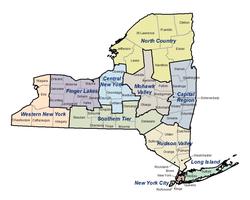Shelf Awareness continues a multi-part series on how booksellers are reacting to a range of laws boosting the minimum wage that have been enacted in various states and municipalities around the country. Last week, we examined how booksellers in California and Washington, D.C., are dealing with new state and local wage requirements. Today we talk with booksellers in New York State. More this week on how bookstores in Seattle, Wash., are responding to minimum wage hikes.
 This spring, New York adopted a multi-tiered plan to raise the minimum wage to different totals and at different speeds across the state. New York City, Long Island and Westchester County will all eventually reach $15 per hour, while the rest of New York State will cap at $12.50. Large employers (11 or more employees) in New York City will hit $15 per hour on December 31, 2018; all businesses in Long Island and Westchester will reach that level by 2021; and the rest of the state will reach $12.50 per hour by the end of 2020.
This spring, New York adopted a multi-tiered plan to raise the minimum wage to different totals and at different speeds across the state. New York City, Long Island and Westchester County will all eventually reach $15 per hour, while the rest of New York State will cap at $12.50. Large employers (11 or more employees) in New York City will hit $15 per hour on December 31, 2018; all businesses in Long Island and Westchester will reach that level by 2021; and the rest of the state will reach $12.50 per hour by the end of 2020.
Greenlight Bookstore in Brooklyn, N.Y., has more than 10 employees and is therefore on the "big employer" roadmap for reaching $15 by the end of 2018. Owners Jessica Stockton Bagnulo and Rebecca Fitting have mapped payroll raises through 2019 and, in order to stay ahead of New York City's minimum wage, recently increased the store's starting wage from $11 per hour to $12.50 per hour.
"Greenlight is profitable and even with this significant increase in operating costs, we will probably be okay," said Fitting. "But if we were a flat business, or if we have a bad year, who knows how it would affect things or if it would be a cost we could sustain."

|
|
| Jessica Stockton Bagnulo and Rebecca Fitting at Greenlight | |
Stockton Bagnulo and Fitting are also investing in a second location, and the store's payroll costs will shortly increase from 16% to 25% of sales. The owners are currently assessing costs across the board to see where any money can be saved, but so far the pair haven't found much. In fact, the best savings they've found is using narrower ribbons for gift-wrapping, which has halved the store's gift-wrapping costs. Stationery and gift items account for about 12% of the store's sales, and Stockton Bagnulo and Fitting are evaluating pricing on non-book items to see if they can improve margins. Any margin that would have been rolled over into discounting will now be repurposed into payroll. But with books being a set cost, Fitting said, the two are in something of a bind. If publishers were to review their terms of sale to see if there is anything they can do to improve booksellers' cost of goods, it would be "very timely," she said.
While she agrees that paying people a livable wage is a necessity, Fitting said that she did not think that the needs or interests of small businesses were adequately considered in minimum wage law formulations. She said she wishes there had been more observation and study as to how the changes impact small businesses, or that small businesses were given tax credits to help ease the blow.
"We believe it's important to pay people a living wage, and we agree that this is the right thing to do," Fitting added. "Whether it is sustainable with the cost of doing business, and the rent climate here in New York City, remains to be seen."
Fitting pointed out that now would be a very good time for booksellers to work on spreading the conversation about New Localism with their local officials, chambers of commerce and other support networks. In places where wage increases are being considered or where they've already been signed into law, officials need to make sure they aren't simultaneously incentivizing online businesses that don't pay living wages or directing traffic away from their local businesses and local tax base, Fitting added.

|
|
| Suzanna and Dick Hermans, Oblong Books and Music | |
Oblong Books & Music, with two locations, in Rhinebeck and Millerton, N.Y., is part of the "Greater New York State" region that will go up to $12.50 per hour. Though the increase in payroll costs will have an effect on the store, co-owner Suzanna Hermans said she felt that the rate of increase for upstate New York is not terrible. Hermans is looking into possibly devoting more space for sidelines and non-book items, and will look at hours to make sure Oblong is not over-staffed. Hermans added that one of the unfortunate consequences of the wage increase is that she will most likely not hire any high schoolers in the immediate future: normally, she likes to have at least one high schooler on staff.
"I think that the speed in which they are going for upstate New York is fair," she said. "Looking at the schedule, it'll work. We'll find a way."
She stressed that the bigger issue, though, is that eventually "we're all going to be at $15." It will happen much sooner in some places than in others, but it is an issue that everyone in the industry will at some point have to face. "If publishers want to make sure we can survive," she continued, they will probably have to make some changes to terms or net pricing. As for removing the prices from books, Hermans said she had conflicted feelings about the idea, but she would be very curious to see if it's feasible.
"Philosophically I think almost all of us are for [raising the minimum wage]," said Hermans. "But we're going to need a lot of help to figure this out."
 |
|
| Christine Onorati, WORD Bookstores | |
Christine Onorati is the owner of WORD Bookstores in Jersey City, N.J., and Brooklyn, N.Y. At the moment, the minimum wages in New York City and in New Jersey are not so different: the New Jersey minimum wage rose to $8.38 per hour in 2015 and the New York City minimum wage currently stands at $9 per hour. Beginning next year, however, the New York minimum wage will increase at a very rapid pace. Many WORD employees, including part timers and some full timers, split their time between Jersey City and Brooklyn. In most cases, their salaries are based on location.
"I'm taking it one step at a time," said Onorati. "And, honestly, for both stores, we're focusing more on decreasing our number of part timers and increasing full time. Because I'm not sure how we can afford to raise all our part timers, especially those who work just a few hours handling our off-site events."
Onorati may have to start saying no to more off-site sales opportunities if the prospective labor costs become too high. She said she worries that having to be increasingly careful about the store's labor costs may curb her team's ability to think outside the box in terms of creating unusual opportunities to sell books. As for support from publishers, Onorati doubted whether there is a single solution. But, she said, if margins were improved, labor costs could of course be more easily absorbed.
"I have always taken pride in paying my employees on the higher end of the scale for our industry," said Onorati, adding that when considering the myriad challenges that independent businesses face today, she feared that retail as a career has become less and less viable. "But this increase for part timers will make it even more difficult for me to justify the costs. And I think it will be very hard for many bookstores to absorb these costs, which then will be one more obstacle in the path to profitability that bookstores face every day." --Alex Mutter

